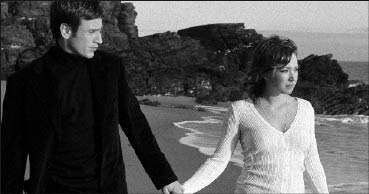The Heart Has Its Reasons, N'est Pas?
by George Sax

Consistency is a more problematic virtue in the arts than in other fields of endeavor. Persistent, adequate similarity of accomplishment is soon enough uninvolving and irritating. Even genre literature and movies are widely expected to offer some measure of invention and variation, and Claude Chabrol doesn’t offer us generic work, even if he shares an all-too-typically French admiration for American suspense movies.
For almost a half-century, the prolific filmmaker has regularly revisited the theme of the powerful, disorienting influence a self-assured and self-contained individual can wield over a more impressionable person. It’s an important component of his first major film, 1959’s Les Cousins. In the latest to be released in this country, 2004’s The Bridesmaid, Chabrol returns to this concept but with more questionable results. It seems to have become a repetitious motif more than an intriguingly reconceived theme. Too much of his movie’s treatment comes off as perfunctory and arbitrary.
Adapted by Chabrol and Pierre Liccia from a work of English novelist Ruth Rendell (who also wrote the book Chabrol used for La Ceremonie in 1996), The Bridesmaid focuses on Philip (Benoit Magimel), a man in his late 20s who is employed in customer relations for a plumbing contractor in a provincial city not far from Paris. Philip is unusually good at his job. He lives with his mother and two younger sisters, the elder of whom is about to marry. Philip, one surmises, provides the financial contribution that permits the family to maintain its suburban petit bourgeois life. But Philip’s life, and his modestly genial, efficient persona are about to be sharply challenged.
At his sister’s wedding, he meets the groom’s cousin, Senta (Laura Smet). One of the bridesmaids, she is a reserved, slightly moody young woman of somewhat offbeat attractiveness. After declining his implicit overture, she nevertheless shows up at his home while he’s there alone and wastes little time in seducing him.
Senta takes Philip into her rather isolated, semi-bohemian life, and his burgeoning need for her overrides his reservations about the quiet, unsettling intensity of her fancies and demands. It is these, combined with his passionate need, that propel him to brutally disastrous consequences.
Chabrol has employed a subdued, deliberate approach in portraying these events. He favors long takes, medium-long shots, and brief pans. The score, by his son, Mathieu Chabrol, sounds something like a more gently swirling version of one of Bernard Hermann’s (North by Northwest). The movie doesn’t play as either psychologically introspective or an exercise in subtle, unexpected menace, although one gathers it’s meant to convey both.
Magimel (The Piano Teacher) looks and sounds right as Philip, and Smet works up a suggestive personal manner that gives the movie some emotional credibility. But as good as they are individually, Chabrol never convinces us of the rapid, compulsive trajectory of their characters’ affair.
Philip is too solidly sensible and astutely competent to so quickly become fatally besotted. If Chabrol is trying to imply an undercurrent of a deranged Freudian family romance in Philip’s circumstances, it doesn’t really come across. His family unit doesn’t seem unduly unwholesome.
The Bridesmaid’s narrative is too mechanistic and untextured. And the last 15 minutes push contrivance and conveniently explosive divulgences at us.
Hitchcock, to whom Chabrol, like many others, has been compared—and for whom Chabrol has expressed esteem—handled the atmospherics and pitch of crazy love much more effectively in the first half of Vertigo (the superior half). Chabrol’s sensibility and interests are rather different, but that doesn’t explain or justify the enervated, cooly distanced tone of this movie.
|
Issue Navigation> Issue Index > v5n34: Old McDonald Had a Farm (8/24/06) > Film Reviews > The Heart Has Its Reasons, N'est Pas? This Week's Issue • Artvoice Daily • Artvoice TV • Events Calendar • Classifieds |









 Current Issue
Current Issue